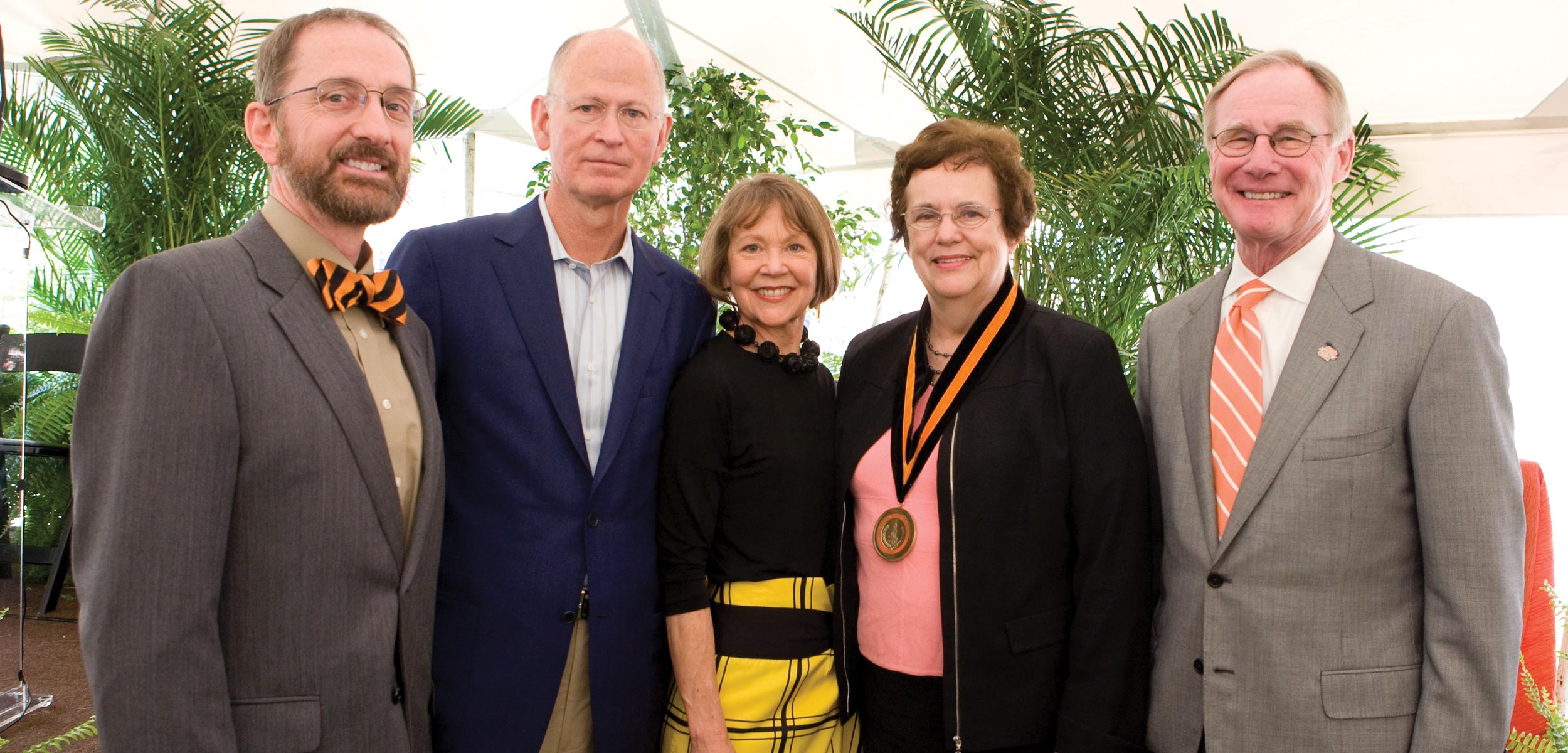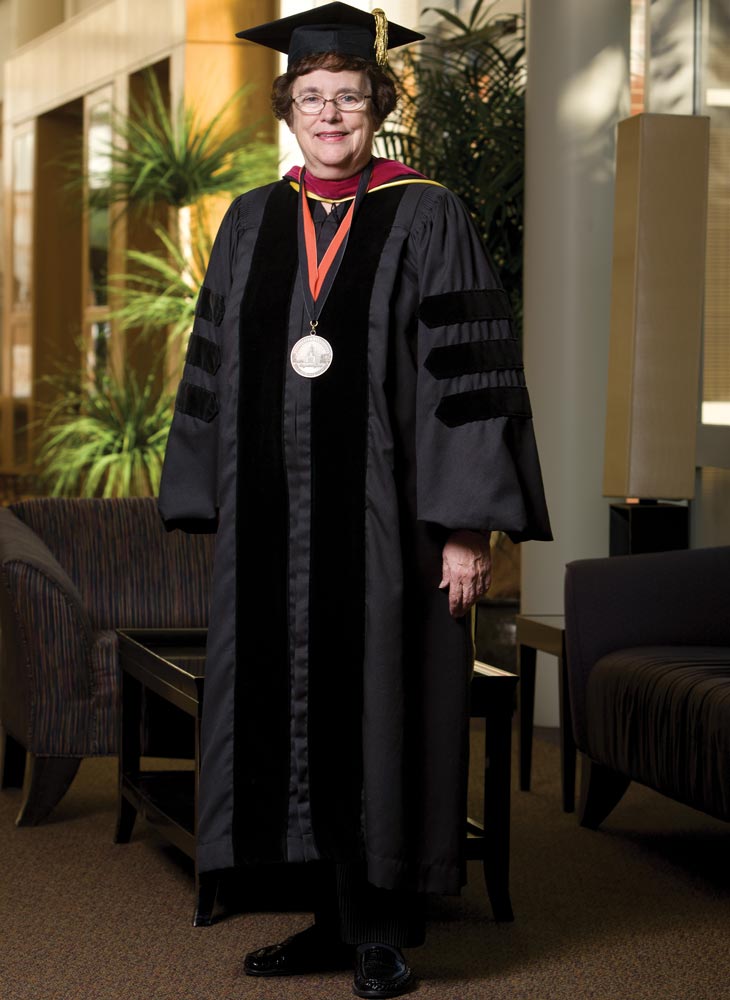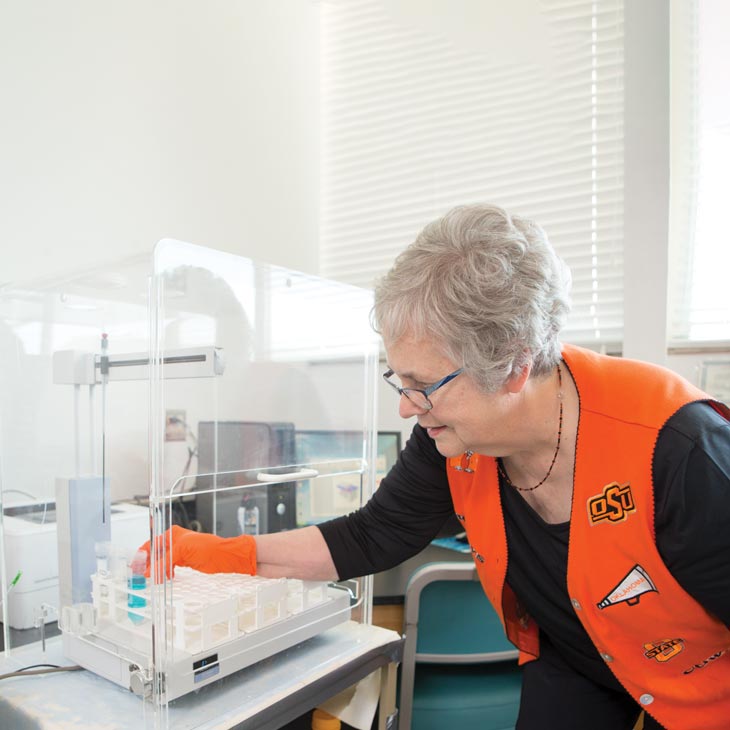
Nurturing Nutrition: Retired CEHS professor reflects on career of promoting nutritional studies
Monday, September 18, 2023
Media Contact: Harrison Hill | Senior Research Communications Specialist | 405-744-5827 | harrison.c.hill@okstate.edu
Early in Dr. Barbara Stoecker’s career, she witnessed malnourished children living on the streets of Jamaica.
The trip was part of a 4-H International Farm Youth Exchange, and while Stoecker enjoyed immersing herself in the Jamaican culture during her seven months there, the thought of those children was always on her mind.
It was 1965, and Stoecker, who had just earned her bachelor’s degree in home economics education from Kansas State University, had a new area of focus: nutrition.
After Stoecker earned her Ph.D. in nutrition from Iowa State University in 1970, she set herself down a path that would last more than 50 years, culminating in her retirement from Oklahoma State University in May 2023.
Stoecker finished her career as a Regents Professor and Marilynn Thoma Chair for the College of Education and Human Sciences’ Department of Nutritional Sciences after a 36 year-long tenure with the university.
However, her career started after her graduation from ISU as a postdoctoral teacher and researcher.
Stoecker and her husband, Arthur, set off for Thailand for the next four years, where her extensive experience in working on international issues truly began.
She joined the National Nutrition Institute and was based out of the Department of Pediatrics at Ramathibodi Hospital in Bangkok. There, she delved deeper into the issues of childhood malnutrition, joining studies in vitamin A needs of preschoolaged children.
When Stoecker returned to the United States, she took a position at Texas Tech University where she earned her tenure. Eventually, Arthur was contacted about a position at OSU that would mark a significant moment in her own career.
Unsure of the change, but intrigued by OSU’s history in international research, Stoecker reached out to friends and colleagues to get insight about the university and the department.
At the time, Dr. Esther Winterfeldt served not only as department head of nutritional sciences at OSU, but also as president of the American Dietetic Association; Stoecker recalls being told
“If Dr. Winterfeldt is there, it’s a place you want to be.”
MOVING TO STILLWATER

In 1987, Stoecker officially joined OSU’s Department of Nutritional Sciences.
Her career largely focused on micronutrient research in children’s health and chronic disease and the study of trace minerals as they pertain to human nutrition. She became the department head of nutritional sciences from 1993 to 2001.
There, Stoecker recalls how much the department changed, including living through the renovation of the nutritional sciences laboratory.
“The space was down to bare bones,” Stoecker said. “We spent about 18 months working out of small cubbies.”
Although the transition to the new space presented its challenges, she thanked former dean Dr. Patricia Knaub for cajoling supporters for the funds to make vital improvements to the space.
“The lab space still serves students well today,” Stoecker said. “The idea was to promote collaboration through an open lab space while providing each investigator with their own bench.
“It’s created a really nice culture amongst the graduate students to help one another in their research.”
Until her retirement, Stoecker helped to oversee the Cellular and Molecular Nutrition Lab and managed specific pieces of the hightech equipment available for use by researchers across the OSU system.
She specialized in the Scanco Medical mCT 40, a unit designed to scan small bone specimens for the creation of three-dimensional models to assess the bone’s structural and biomechanical properties without damaging the original, as well as the Perkin-Elmer Elan 9000 Inductively Coupled Plasma- Mass Spectrometer (ICP-MS).
The ICP-MS is used to determine amounts of trace elements present only in the parts per billion range in the analysis of biological and environmental samples, such as blood, serums, food, water and soil.
INTERNATIONAL STUDIES
Stoecker eventually returned abroad as part of OSU trips, going to China, Jordan and Iraq, as well as Ethiopia where she has focused much of her research in micronutrients as it pertains to the health of children.
Stoecker was part of a cohort of professors sent to Ethiopia to assist in establishing a master’s program in applied human nutrition. At the time of their arrival to Hawassa University in Awassa, Ethiopia, the only similar offering was a two-year program in modified home economics.
She said the program was developed in a way so that students would take one class at a time, with 15 hours of weekly coursework plus exams, to complete an entire semester’s worth of curriculum in just three to four weeks before moving on to the next.
“Dr. Stoecker’s professional dedication, devotion and humility has inspired so many of us to contribute what we have to offer to the field of nutrition. She is not only an excellent mentor with farsighted leadership, but has become a genuine family friend over the years.”
Because the instructors were coming from all over the world to establish the program — Stoecker noted a Canadian group as well as several German faculty in addition to her OSU colleagues — the goal was to move through the program at a quick enough pace that the students who had completed the new master’s program would then be able to teach undergraduate coursework macronutrients.
Beyond teaching and curriculum development in Ethiopia, she’s also played an active role in helping native graduate students to secure funding to attend OSU to continue their education.
Current OSU Ph.D. candidate Hailu Reda, who has known Stoecker since 2013 and has been studying under her supervision, is appreciative of her work in his home country of Ethiopia.
“Dr. Stoecker’s support of Hawassa University is unmatched. Without her support, the master’s of science program in human nutrition would not have been realized,” Reda said. “I am very lucky to have had the opportunity to study under her. She’s a very supportive, humble and generous advisor.”
Seeing the growth of that program has been a highlight of Stoecker’s career.
“So many of the folks that we taught in the early years of the master’s program have now gone on to become leaders of nutrition in their country,” Stoecker said.
UNFORGETTABLE IMPACT
Unsurprisingly, her career has been marked with a multitude of accolades.
Stoecker was named an OSU Regents Professor in 2002, received the university’s eminent faculty award in 2008, and in 2010 was honored to receive the Michael P. Malone International Leadership Award presented by the Association of Public and Land-grant Universities.
She received the university’s Regents Distinguished Research Award in 2015, and in 2016 was selected for induction into the Oklahoma Higher Education Hall of Fame.
Stoecker was recently awarded an honorary doctorate degree from Hawassa University for her tremendous contributions in teaching and research.

Despite being highly regarded throughout the field of nutrition on an international scale, praised as a pioneer of discoveries in trace elements, and a highly distinguished scholar with more than 250 authored or co-authored published works as well as 17 funded grants, Stoecker has remained humble. Her biggest achievement has been training and mentoring the next generation of nutritional scientists abroad and at home.
Stoecker recalls her time spent in Stillwater fondly.
“One of the best parts of our time here was raising our three children in this community. We have two OSU grads and a graduate of Drake University,” she said. Family is of high value to Stoecker — and that has extended beyond her own.
“We really have gained special friends and become close to many families,” she said.
She and Arthur opened their home for many years to agricultural economics and nutrition students, as well as other ‘found’ students as she referred to them, for the Thanksgiving holiday when the students were unable to travel to their own families.
For this reason, among others beyond her scholarly efforts, Stoecker has been well-liked by her students and is known for being generous with her time.
Stoecker said watching the department’s curriculum evolve over the last few decades has been fun. She remembers when the option for premedicine was added as a program and how amazing it’s been to witness the significant number of those graduates who have gone on to practice medicine. Allied health followed and has produced a multitude of registered dietitians across the nation.
Fellow OSU professor Dr. Edralin Lucas, who Stoecker hired in 2005 initially as a lab manager, said for as long as she’s known Stoecker she’s been calm, soft spoken and good natured.
“She’s one of the hardest working people I know,” Lucas said. “She would spend months abroad focused on her research, and be back to teaching her students at OSU the day following her return without skipping a beat.”
This sentiment was echoed by many others she’s engaged with over the years.
Dr. Yewelsew Abebe, professor and associate vice president for research and development at Hawassa University, came to OSU through an African Women’s Leadership Scholarship and studied for her Ph.D. under Stoecker’s advisement.
“Dr. Stoecker’s professional dedication, devotion and humility has inspired so many of us to contribute what we have to offer to the field of nutrition,” Abebe said. “She is not only an excellent mentor with farsighted leadership, but has become a genuine family friend over the years.”
Other faculty and students from Hawassa University shared resounding words of gratitude for Stoecker’s guidance, with an overarching message.
“She is the mother of us all,” they said.
Photo By: Phil Shockley
Story By: Kirsi McDowell | Research Matters Magazine
